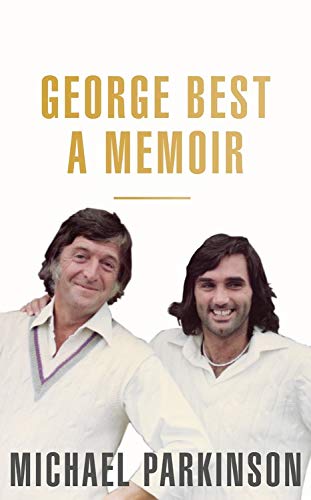George Best died in November 2005, aged just 59, but his legend means that his name still lives on undiminished – and so too the interest in him. He was, unquestionably, a mercurial and complicated figure – a man who had it all but sadly couldn’t keep the demons away.
Lifelong friend Michael Parkinson saw Best at his highest and his lowest – both on and off the pitch – and thus writes this latest memoir from the privileged position both of Best’s friend but also as a journalist. As such it is equally a warm recollection and yet at times a critical assessment of this troubled character, compounded perhaps by what comes across as something of a lack of understanding about the nature of addiction. It is, of course, a difficult subject to broach, not least for someone close by watching another self-destruct, but it does feel as if the emphasis on Best’s troubles with alcohol are equated more often with a matter of choice than illness.
Best, it is repeated, is not a man who accepted pity, but the book does perhaps not have the empathy I had expected. I also found some of the writing quite unappealing, notably a couple of sections when Parkinson seemingly puts words and thoughts into Best’s head, which seems particularly strange given his reference to Best’s comment, ‘Nobody knows me’. In contrast, the book is at its strongest in the transcripted interviews with the man himself and the players and managers who knew him best on and around the pitch. Here we get to see both the awe at his footballing brilliance and the poignancy of a life derailed.
Best’s own assessment of the lack of support for footballers, the intrusion of the outside world and the philosophy of the British media are all particularly sad indictments and also understandable pressures on a young man upon whom the mantle of being the first real footballing superstar was thrust. What the book does do really well is it to pose some thought-provoking questions, not least about whether Best may have had a different experience had he been playing today, or whether even the support structures in place nowadays are really any better.
Another question that crops up is that perennial one of who is the best: Best, Messi or Ronaldo? But phrased not in terms of today but of Best’s era, it opens up the debate once more. Indeed, it is not a question of whether Best could have matched Messi and Ronaldo in the modern game but whether Messi and Ronaldo could have equalled Best in his era. It’s an interesting one, as too is that of how he would have fared under today’s managers. The portrait of Busby’s handling of him seems far removed from today’s footballing culture and makes you wonder just how Best’s career may have transpired under Sir Alex Ferguson, Pep Guardiola and, most intriguingly perhaps, Jose Mourinho.
The book ends with a reflection from Michael Parkinson’s son, Michael Junior, and it is perhaps one of the most touching moments of the memoir, as the junior Parkinson remembers having a kickaround with Best in the garden – or rather, as it turned out, a run around for the Parkinson boys as they chased United’s unplayable winger – a funny set piece in many ways but also a somewhat perfect portrait of both the joy and isolation football brought Best.
Whether or not you played football with Best in the back garden, watched him rule the pitch and fall from grace or know only of him through the reflections of the previous generation, you can’t help closing this book with a sense of loss, of what might have been. And though Messi and Ronaldo rule the roost today, despite his troubles, Best’s name continues to reverberate with theirs, which would surely please the man who said, ‘If only one person thinks I’m the best player in the world, that’s good enough for me.’ Fortunately, there is still a generation of people who think Best was the best player in the world, and maybe, just maybe, the greatest of all time.
Jade Craddock
 During a twenty-five-year managerial career, Danny’s teams have won trophies, promotions, and celebrated last-gasp relegation escapes. Danny managed over a thousand games for Barnsley, Sheffield Wednesday, Bristol City, Milton Keynes, Hartlepool United, Swindon Town, Sheffield United, and Chesterfield. Prior to that he had an extensive playing career, pulling on the shirt for Wigan Athletic, Bury, Chesterfield, Nottingham Forest, Scunthorpe United, Brighton & Hove Albion, Luton Town, Sheffield Wednesday and Barnsley, as well as representing Northern Ireland.
During a twenty-five-year managerial career, Danny’s teams have won trophies, promotions, and celebrated last-gasp relegation escapes. Danny managed over a thousand games for Barnsley, Sheffield Wednesday, Bristol City, Milton Keynes, Hartlepool United, Swindon Town, Sheffield United, and Chesterfield. Prior to that he had an extensive playing career, pulling on the shirt for Wigan Athletic, Bury, Chesterfield, Nottingham Forest, Scunthorpe United, Brighton & Hove Albion, Luton Town, Sheffield Wednesday and Barnsley, as well as representing Northern Ireland.